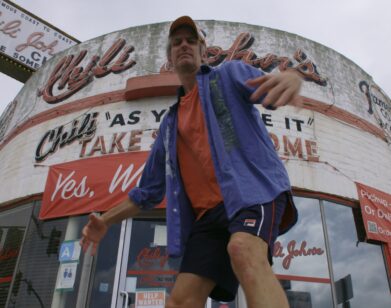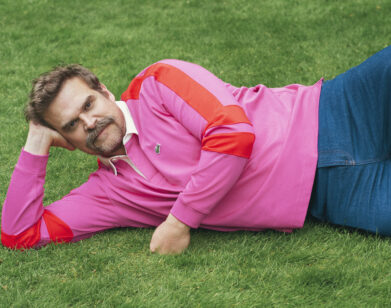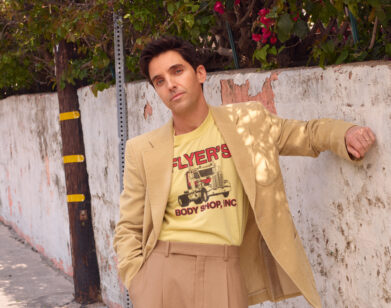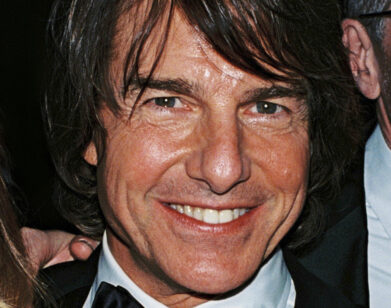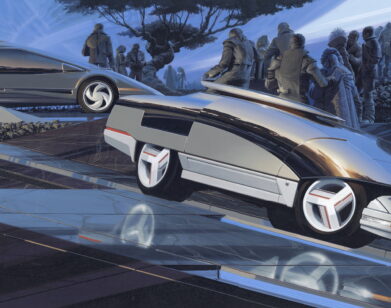Mads Mikkelsen’s Wild West
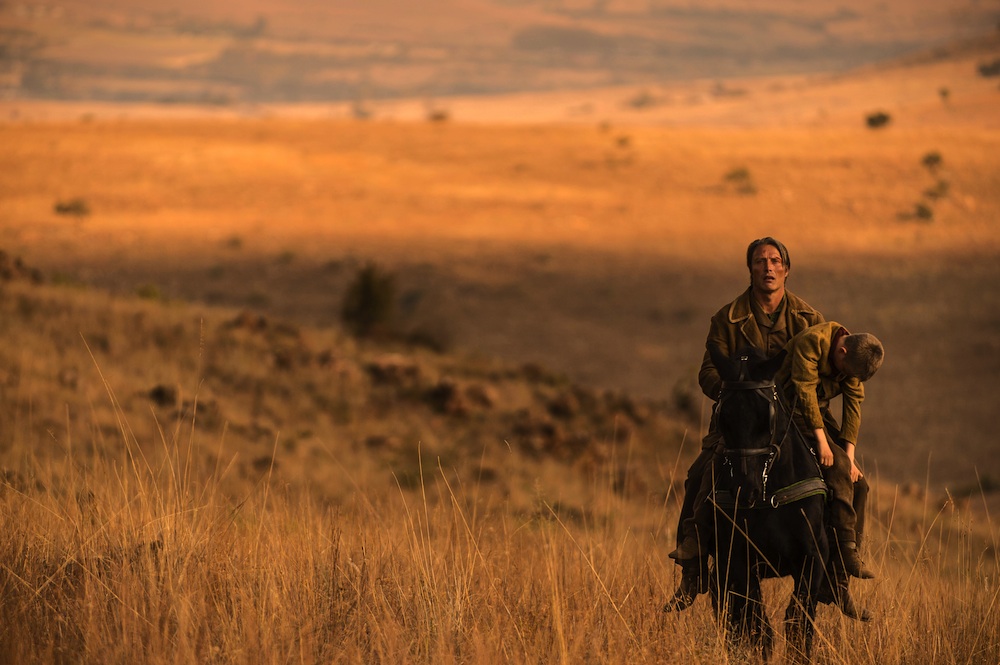
ABOVE: MADS MIKKELSEN IN THE SALVATION. PHOTO COURTESY OF JOE ALBIAS.
To many Americans, chiseled Danish actor Mads Mikkelsen is best known as the James Bond villain Le Chiffre, who cried tears of blood during a tense, heads-up poker game against 007 in Casino Royale (2006). More recently, however, Mikkelsen has been playing the title role in NBC’s Hannibal and is starring in fellow Dane Kristian Levring’s latest film The Salvation, which premiered in a special out-of-competition screening at the Cannes Film Festival.
Mikkelsen plays Jon, an ex-Danish soldier, who, along with his brother, emigrates to the American West in the late 1800s. The film opens with Jon welcoming his Danish wife and son to the Old West; very shortly thereafter, he witnesses their killing. So begin the core themes found in all great westerns: heartache, revenge, and, most importantly, redemption.
On a sunny, windy day in Cannes, Mikkelsen—who was last at the festival in 2012 when he picked up the best actor award for Thomas Vinterberg’s The Hunt—sat down at the Silencio terrace and talked about his career, The Salvation, and one particularly nasty accident that happened on set.
DAVID BOURGEOIS: Congrats on the film, nicely done. How’s the festival going for you so far?
MADS MIKKELSEN: Thanks, it’s going great. Well, it started off bad in the sense that all the planes were striking. So I had to drive from Barcelona and rent a car and go all the way down here. But we’re happy to be here and proud of our film, and Cannes has been hospitable once again and invited us.
BOURGEOIS: I’m a big fan of westerns, and it’s a really well done film. It’s a nice change of pace amidst the other… heavier types of films being shown here.
MIKKELSEN: [laughing] What we call kitchen-sink dramas…
DAVID BOURGEOIS: Exactly. So tell me, growing up in Denmark, did you watch a lot of westerns?
MIKKELSEN: Like everyone else, yes. But I’m not in the same club as Kristian [Levring], the director. He has a love affair with westerns, and making one has been a childhood dream since he was five years old, I think. But I saw westerns. I was getting more interested when Clint [Eastwood] came up and made a masterpiece himself with Unforgiven. But the anthology of the western is always there: the good versus evil, the revenge, the justice. You see that in kung-fu films, you see that in Akira Kurosawa films. You see that mythology in a lot of places. But what’s important about all those films is that you have to throw some people in there, you have to throw a drama in there. The genre then becomes the hat you wear later on. But you first focus on making a drama. In The Salvation, something dreadful and heartbreaking is happening to Jon, and he looses everything he’s ever had. And then he loses everything once more.
BOURGEOIS: Your character clearly seems to be in a no-win situation. In preparing for the role, did you look at other acting performances in westerns or just go in cold?
MIKKELSEN: I tend not to have any references to anything. I just jump into the script in front of me. If you reference too much, you have no idea if the performances are right. A funny story about that: All the houses shown in this film are true. Kristian studied the time and photos, and he knows for a fact that the reason all the western towns built on Hollywood [sets] were three stories, was because the square-foot price to build in Hollywood was so expensive. So they just built them like that; it had nothing to do with how houses actually were in the [old] west. So you have to be careful with references.
BOURGEOIS: Do you recall specific westerns, ones that stand out in your mind?
MIKKELSEN: All the Ford films—Kristian can name all of them, I can’t. I saw a lot and liked them. Those are images that are printed on your imagination. I vividly remember Charles Bronson’s face in Chino. The western genre is screaming for a face like that. This is a man who’s been through some hard times. Words so often fuel westerns, they’re set in a different time when we didn’t talk too much. The scenario, the stenography, the landscape tell the story about a little man against the universe. So faces are important for the western genre. We have plenty of remarkable ones in our film, one being Eric Cantona [who plays a killer named the Corsican]. He’s born for that as well.
BOURGEOIS: One challenge for non-American actors playing in westerns is nailing the accent. How’d that work for you? Did it come naturally?
MIKKELSEN: We weren’t going for any accent, actually—more of a neutral thing. You’ve got to remember, the West was built by Europeans. It was probably a cacophony of a hundred different accents. People may speak German with each other in one corner, but they speak English to each other [somewhere else], with the French in another. We really weren’t too worried about the accents, because multiple languages were commonplace back then. We just wanted to lean towards Midwest-kind-of-whatever—at least get away from the British [accent].
BOURGEOIS: A little bit on your background: You were a gymnast and dancer. Did those skills come into play when you were doing the action sequences?
MIKKELSEN: For sure. The skills are always there, but I’m not super-aware of it much anymore. I was a gymnast for many years before I was a dancer, so it comes in pretty handy when we do stunts. [He turns and points off the balcony to patio about 20 feet below.] I don’t know, I think I could probably make it down there from here, just do a few flips and land on my feet without getting too many bruises. [laughs] The physicality of any character is always split up into fast, slow, high energy, low energy, what kind of personality he has. So that’s where the physicality comes in. And flying through the air is just something you have to do if they ask you.
BOURGEOIS: Injuries come with the territory here, I imagine. What about on this film? How bad were they?
MIKKELSEN: [laughs] Nonstop. That goes without saying in any film where there’s physicality in it. But for this film, I was responsible for my worst injury. I have this beautiful South African knife that I bought. It’s pretty heavy, and one day I dropped it right onto my finger; it was cut really bad—almost right to the bone. Easy enough of an injury, right? I was thinking, “It’s bleeding. Just wrap it up.” But of course because it’s a period film, you can’t wear a Band-Aid, so we did all kinds of tricks to hide it and kept shooting. But within an hour, my finger was massive, swollen. And the doctors were seriously discussing whether it should be cut [points to parts of his finger], here or here. I was like, “Hold it, hold it!” Of course, we’re filming in South Africa, and there are bacteria and such that my body simply wasn’t used to, so it got infected. But that was entirely my mistake.
BOURGEOIS: Holy man. That’s major. What ended up happening?
MIKKELSEN: I took all kinds of drugs. Doctors were waiting a couple days to see if [the infection] spread. We were crossing our fingers. But it was finally healed.
BOURGEOIS: So you mentioned South Africa, you filmed there?
MIKKELSEN: Just outside Jo’burg.
BOURGEOIS: How was it to re-create the American West in that part of the world?
MIKKELSEN: Fantastic. The landscape is exactly what we wanted: the dust, the wind. We were nonstop dirty; no point in taking a shower. [laughs] The landscape was a player as it always is in a western film. The strange and Kafkaesque universe was that we were standing there doing a very white-person period of American history with a classic western white cast. But the crew was speaking predominantly Xhosa and Afrikaans and making click sounds. It was two worlds.
BOURGEOIS: I was surprised to see Jonathan Pryce in the film, as the corrupt mayor.
MIKKELSEN: It’s funny, he and I had a strange bit of similarities. He won in Cannes [in 1995 for Carrington] and I won in Cannes. We did many of the same things when we were younger. He was a gentleman and is classical English. He has a subtle sense of humor that some people just don’t understand and get afraid [of]. If someone found him extremely rude, he was like, “They don’t get it, I don’t care”—there was no way in hell he was going explain his humor. But he’s a splendid actor; I enjoyed his company a lot and he’s a really great person.
BOURGEOIS: So American audiences know you now from television—Hannibal—and Casino Royale. Doing the whole L.A. thing seems to be the logical next step, no?
MIKKELSEN: Well, I’m based in Copenhagen and have never actually worked in America. Everything that’s been shown in the U.S. has either been shot in Prague, Romania, or England, some other location. It would be ridiculous for my family to live in L.A. while I work in Europe. I mean, I go to L.A. and shake hands a couple times a year. But I’m happy mixing it up. I’m in a very lucky position. You have to remember that 95 percent of all actors aren’t working. I’m actually able to go to France and work. It’s a situation I couldn’t have dreamt up, but right now it’s good, but who knows, it could change tomorrow. [laughs] I’ll go where the work takes me.
BOURGEOIS: Most recently it’s been taking you to TV. How has it been working on Hannibal?
MIKKELSEN: We just did our second season, shooting in Toronto. It’s about a six- to seven-month shoot a year, which takes a good chunk out of my life. It’s a super-interesting, very radical production to be involved with. I think we get away with stuff nobody has done before on network TV.
BOURGEOIS: TV programming in America has become an all-out battle.
MIKKELSEN: Yeah, but Hannibal isn’t even on cable. We’re talking network TV here. I think we’re crossing some boundaries that initially [the network] was very afraid of. But for some reason they closed their eyes and let it go.
BOURGEOIS: I’ve heard rumors for a while that you’re starring in a remake of the 1972 Spanish cult-western Cut Throats Nine. True?
MIKKELSEN: Not true. Cut Throats Nine is a radical, fucked up story. I have no idea why that never happened. I hope it’s still being worked on, because it’s a crazy-interesting project.
BOURGEOIS: So what’s on the horizon for you?
MIKKELSEN: I’m working with [The Salvation] screenwriter [Anders Thomas] Jensen. We’ve made three dark comedies together, and his universe is [David] Lynch/Coen brothers, but even crazier. It’s a beautiful story, but has characters you don’t want to spend more than three seconds with.
THE SALVATION IS CURRENTLY SCREENING AT THE CANNES FILM FESTIVAL IN FRANCE.

